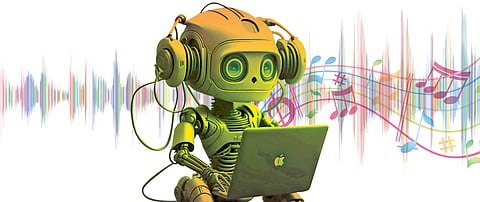

CHENNAI: When worries over artificial intelligence (AI) tools taking over jobs peaked last year, the assumption was that it would first disrupt the simple, repetitive tasks done by humans and then move to higher-level jobs that involve a high degree of creativity, dexterity, and complexity. However, one year down the line, the opposite seems to have played out globally with unlikely casualties – creative artists, musicians, and actors.
Oscar-winning composer A R Rahman recently used AI software to recreate the voices of late singers Tamil playback singers - Bamba Bakya and Shahul Hameed, marking a paradigm shift in the use of technology in music production in India. In his latest album ‘Lal Salam’, Rahman ‘brought back’ the voice of the two popular playback singers of yesteryears.
The experiment stirred heated discussions, ranging from awe to criticism to concern. In a chat with TNIE, Rahman dispelled the notion that AI will kill creativity. According to the legendary music composer, AI is just a tool and that it cannot replace human creativity.
Explaining the rationale for recreating the voices of the late singers, Rahman said the album demanded the voices. “I thought why not bring them back since we have the technology now. Some people texted me saying it made them emotional. It made some listeners nostalgic,” he said. The process involved the AI model learning the singers’ voice with a dry voice recording and mimicking the version sung by a source singer.
“It learns multiple songs. (Also), we had to find a singer better suited for the AI model to replicate,” Rahman said.
The AI voice cloning was done by Pitch Innovation, a Chennai-based music software company which uses voice models from studio recordings.
Rahman stressed that they used the technology in a fair and ethical manner. “It is important to check with the family. Is the song and lyrics okay? Do they agree with the lyrics?” he said, adding that the families gave their consent. They were also given compensation.
Responding to a question about fears of job losses, he said: “There is no need to feel threatened by this technology.” He added: “AI has been there for a long time. Even the auto-tune has AI. It is just a tool. Now everybody talks about AI. It doesn’t do anything on its own. It doesn’t alter the tune; it just changes the voice textures of the source singer and alters the timbre.”
Rahman feels there is a lot of room for improvement as AI voice models are only about 60% correct. “We should do it when it is really right,” he said, adding that generative AI is fantastic in producing visual art.
On the creative aspects of AI-backed art, he said the human element in music production is important and that’s what makes creativity amazing. “I don’t think that will go away,” he said.
Referring to the times of Napster and LimeWire, he said it was a chaotic period that saw all the legit stuff was pirated. Napster, which served as a platform for sharing copyrighted music, gained prominence in the 2000s and eventually led to the birth of iTunes and iPods.
AI is accessible to anyone and its use in the music industry has been democratized. Rahman said his attempt was to take a lead and find some clarity. On the long-running debate of copyrights in AI training, he feels it is necessary to get permission from the creators – composers and producers. “You cannot steal from somebody. That is unethical. You need permission,” he said.